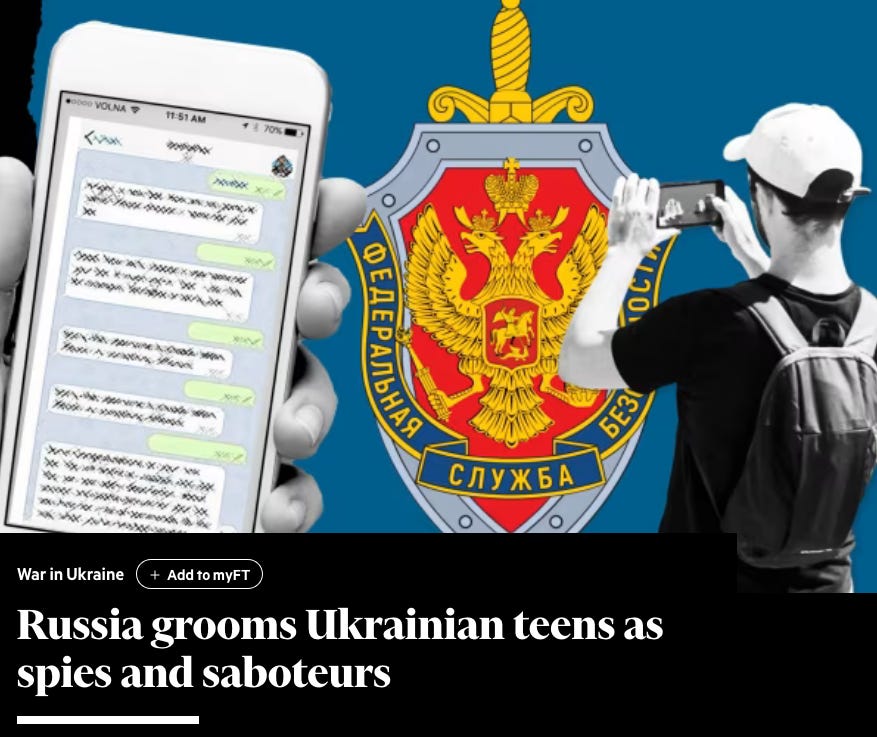ADMIN NOTE: This is a departure from the normal coverage of operational analysis of the Far Left. I’m going to expand slightly to cover additional topics related to intelligence, insurgency, revolution, civil war, etc. Thank you for reading. - M.S.
FT has a decent article about the fight between Russian FSB and Ukrainian SBU over online recruitment for domestic sabotage. I’ll hit the high points below:
This week, Ukraine’s SBU (domestic security agency) arrested a 16-year-old kid allegedly spying for Russia.
SBU discovered photographs of Ukrainian troop positions and critical infrastructure, and GPS coordinates for potential Russian missile strikes.
The kid was allegedly recruited by Russian intelligence agency FSB (KGB successor) to pass this information in return for quick cash.
Some of these kids reportedly believe they are playing a game, like a scavenger hunt, with a financial reward at the end.
Of the 700+ Ukrainians arrested roughly over the past year for espionage, arson, and bomb plots, some 25% have been under age 18.
SBU also arrested a Ukrainian woman for allegedly building an IED (via guided Russian instruction online) and carrying out a bombing in Kharkiv. In a separate case, two teen boys allegedly built a bomb with the help of Russian agents online for an attack on a train station.
The Russian domestic sabotage campaign started “with tasks of burning cars [and] electricity hubs along the railway” then “burning military recruitment centres” then “switched to using Ukrainians as suicide bombers”. [source]
My initial considerations:
There’s lots of attention on how drones are changing how wars are fought. War will never be the same. Neither will security, because drones make security even more relative. Any target, regardless of where they are, can be targeted remotely and relatively cheaply.
But this Russia-Ukraine conflict also shows us how targeting data is becoming cheaper and easier, too. Cost is no longer a barrier to entry. You don’t necessarily need a multi-million dollar satellite for imagery when a $300 drone will do — nor when you can pay a kid $100 to get a ground-level/cross-section photo of your target that a satellite can’t. Like drone warfare, this kind of targeting data will no longer solely be the realm of nation-states. This essentially democratizes the targeting package.
This week, CNN coverage of the ICE reporting app — where users take photographs and report real-time location of ICE personnel and vehicles — shows that crowdsourced information will be extremely useful for intelligence and targeting during a time of war. Antifa has done something similar, to report and track the locations of police in riot gear, going back close to a decade. So, it’s nothing new, but Russia-Ukraine shows that informers don’t need to be ideologically sympathetic to be useful. For instance, how many teens would be willing to take photographs of power stations and other critical infrastructure; homes where law enforcement vehicles are parked; or security features on the homes of local political figures?
There have been entire crowdsourced intelligence websites where a requirement is published and users can win prizes for providing accurate information. Is there any reason that intelligence collection couldn’t be further gamified?
In a domestic U.S. conflict scenario, weaponized drones and this type of crowdsourced intelligence imposes another cost-benefit dilemma for defenders. Just like weaponized drones are difficult to stop, you simply will not be able to stop (cheaply) most intelligence collection that enables targeting. Defenders will struggle to maintain those costs, and how do you determine your ROI? If you aren’t attacked, is your defense working or is no one attacking you? Is your counterintelligence working, or is no one collecting on you? You simply may never know.
Discussion questions:
Are we seeing this kind of intelligence gathering change war like we’ve seen drones change war?
Is the nature of intelligence changing as we see a shift in who is collecting information, how they collect it, and why they collect it?
If you have something to contribute, please leave a comment.
Mike Shelby is a former Intelligence NCO and contractor, and veteran of Iraq and Afghanistan.




Great article.
See the excellent 'Events in Ukraine" Substack for some fascinating breakdowns and insights into SBU stewardship of Ukrainian scam call centers, neo-Nazi groups in Ukraine and Russia, terror cells, likely FSB double-agents and whatnot.
This will keep you up at night. In addition to teens being employed, cartels could employ drug users, homeless people. Even pensioners. You will never know who is providing information to whom. This may further divide an already divided and suspicious population and media will capitalize on it.